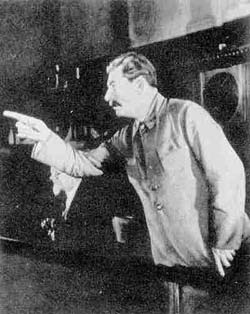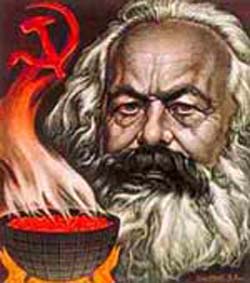 |
Book Reviews
A Distributist Manifesto
Strongly Spiced With Communism
Patrick Odou
Book review on Distributism: A Manifesto, by Arthur J. Penty, 1937, 24 pp.; (pp. 86-110)
in Distributist Perspectives, Volume I (Norfolk, VA: IHS Press, 2004), 126 pp.
Before reading this book, I read Arthur Penty’s A Guildsman’s Interpretation of History, published in 1920, on which I wrote a review (click here). I exposed the socialist, communist, materialist, and anti-Catholic positions of Mr. Penty. That book was over 300 pages and gave a full development and elaboration of Penty’s theses.
Today, I analyze Arthur Penty’s essay – Distributism: A Manifesto – which is only 24 pages and written the year of his death – 1937. I found no change in any of his positions. It was more of the same.
Praises for Stalin’s idea of “property”
Penty, speaking on behalf of all Distributists, is either a naive supporter of, or an accomplice to, the new plan for small proletarian property that Stalin introduced in communist Russia in 1936. Even though Penty attacked the previous atrocities, which he called pure Communism, his critique is made in a way that justifies Stalin’s reforms.
He wrote:
“Distributists would point out that the Bolshevists are returning to the system of private property. After putting millions of people to death, …. they have to come to the conclusion that pure Communism does not work, because it destroys initiative and leaves people without a motive in life. Hence, in the future, people in Russia will be permitted to own property up to a certain amount.

In 1936 Stalin made a softer program with regard to property, without renouncing any of the Communist principles.
Above, the dictator in 1935 |
"The new Constitution (1936) guarantees private property in houses, household furnishings, articles of personal consumption and comfort, and savings accounts; further, it permits a peasant on a collective farm to own animals, implements, and a small plot of land, while he may dispose of his crops freely” [emphasis added] (p. 88).
Penty is praising Stalin’s system that so spectacularly failed in the USSR. History tells us that workers were persecuted by the government for owning more than two cows. Was this what Penty meant when he said Distributists aim for “sufficient production?” (p. 103). The quote above leads one to this conclusion.
Agreement with Karl Marx’s concepts
Penty also quoted and agreed with Marx’s concepts concerning production of goods and class struggle:
“They [the previous political and economic writers based on Natural Law] do not, like Marx, see that ‘all means for the development of production transform themselves into means of domination over, and exploitation of, the workers.’ As a consequence at the end of the process we do not get wealth for all, but a problem of power, the struggle for which does not end in the factory but on the field of battle” (p. 103).
The Marxist theory that the plus valia [greater or extra value] of capital does not belong to the owner of the capital but to the manual worker also seems to be approved by Penty. Although he criticized some aspects of Marx’s doctrine, he affirmed that “Marx [correctly] saw that all measures of increasing the production of industry are brought about at the cost of the individual labourer” (p. 103).
More Materialism
True to the materialist mindset of all socialists, Penty has a materialist conception of civilization:
“Before the introduction of money, which happened in the seventh century before Christ, culture existed, for culture is of the spirit, and does not finally depend upon the development of the material accessories of life, which is what we understand by civilization” [emphasis added] (p. 100).
This conception doesn’t reflect the common understanding of civilization. According to common sense, civilization is the ensemble of moral, religious, social, scientific and technical characteristics of a particular society or group of societies. It is in this sense that one speaks of Christian Civilization, Roman Civilization, Egyptian Civilization, etc. Again, Penty’s concept of civilization is profoundly materialist.
More Anti-Catholicism
In A Guildsman’s Interpretation of History, Penty insulted St. Thomas Aquinas portraying him as a corrupt theologian: “It is insufficiently realized that his [St. Thomas’] teaching about property was of the nature of a compromise intended to reconcile stubborn facts with the communistic teaching of the Gospel.”

Penty defends some of the theories of Karl Marx, pictured above. Time, February 23, 1978 |
In his Distributist Manifesto, Penty’s criticisms of the Church continued. According to him, the Church would have naively considered Economics as only linked with Moral concerns and not with Social concerns, which is not true. Regarding Economics, the Social Doctrine of the Church is extensive and has been developed continuously throughout her history. Penty also ignored the fact that the Catholic Church was the inspirer of the Guilds, as well as many other intermediary societies: universities, charitable associations, hospitals, chivalry, etc. It is difficult to understand how a man who pretends to present a historic thesis ignores History. What he states here is quite different from what happened:
“It was one of the tragedies of history that…the Church, perhaps because the clergy were without experience in the world, made the mistake of assuming that because the problem of money was primarily a moral issue, it was entirely moral. She failed to see that just prices could only in the long run be maintained on the assumption that they were fixed prices with Guilds to maintain them. In consequence, no effort was ever made by the Church to make Guilds and fixed prices co-extensive with society…” (p. 101).
He insisted again that it was the Church’s supposed short-sightedness and inability to understand the nature of economic problems that generated the new Capitalist system. This supposed failure of the Church is responsible for the breakdown of the previous economic reality based on the Guilds. He asserted:
“Simultaneously, the laws against Usury broke down, because of the mistaken attitude of the Church. She treated the problem of usury as She had that of price, as an entirely moral issue. The result was that no provision was made for people who stood in need of money and, as a consequence, in rural areas, where there were no Guilds to protect them, they had no option but to have recourse to usurers. ….
"The result was that exception after exception was made until the whole system of prohibition [of usury] broke down [and usury became free]; it never occurring to the Church that the principal reason for their failure to hammer out some principle whereby public convenience could be related to some definite moral standard was due to the fact that they had treated as entirely moral a problem that was only partly moral” (pp. 101-2).
Penty’s fantasy history of the Church continues. He says that after the Church’s failure to grasp economic problems, she decided to back away from them, hoping they would correct themselves:
“As a consequence the idea grew that the failure of the Church to suppress usury was due to the fact that it attempted the impossible, whereas, in fact, it mistook the nature of the problem; and the idea was promoted that the only rational thing to do was to stop meddling and leave the problem to settle itself, on the assumption that if there was no legal prohibition, the rate of interest would fall and usury would no longer present a problem.” (p. 102).
As a side note, let me point out that in looking for an early copy of Distributism: A Manifesto, I found only one book by Arthur Penty – and it was about architecture. I found nothing in the entire Los Angeles County Library System, and nothing at the Universities I attended – U.S.C. or California State University of Los Angeles. In other words, Penty’s theses would be buried if they were not being re-circulated by so-called traditionalist Catholics. It must be said that I believe these groups do great harm to the Catholic cause.
To those who are still considering Distributism
If the IHS Press is correct in stating that “Penty … became the most profound thinker of the Distributist and related Guild movements” as is stated in the same book (p. 125), then it must be concluded that Distributism, having strong similarities to Communism, is part of the problem, not part of the solution.
The romantic solution: ‘flee to the fields’ to avoid the bad things of the cities, is not necessarily a good solution because in this world of same-day delivery, Internet, satellite communication, and supersonic transportation, the Revolution will simply follow you. The only way to fight the Revolution is to fight it wherever it is, not to flee it.
I would add that it seems to me unrealistic to try to establish a true Catholic social order while the present crisis dominates the Church. How can one pretend to make a new Christendom with Progressivism infesting the Catholic Hierarchy on all levels, with liberal, communist, and socialist clergy spreading the Revolution everywhere, with pan-religious ceremonies at Assisi and John Paul II kissing the Koran? Under such conditions how is it possible to ignore the Revolution and flee to the fields to establish a new Catholic order?

Posted on October 25, 2004

Related Topics of Interest
 Socialism and Distributism in Catholic Clothing Socialism and Distributism in Catholic Clothing
 Eric Gill: the Pedophile Founder of Distributism Eric Gill: the Pedophile Founder of Distributism
 Other Moral Pearls of Eric Gill Other Moral Pearls of Eric Gill
 A Torrent of Pros and Cons on Eric Gill, a Founder of Distributism A Torrent of Pros and Cons on Eric Gill, a Founder of Distributism
 Eric Gill, a Precursor of Vatican II Eric Gill, a Precursor of Vatican II

|
Book Reviews | Home | Books | CDs | Search | Contact Us | Donate

©2002-
Tradition in Action, Inc. All Rights Reserved
|
 |
|